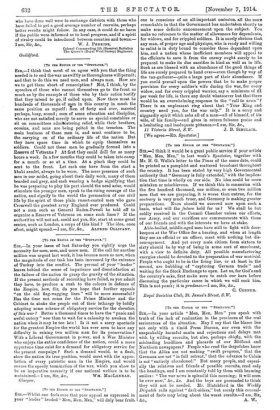[To TEN EDITOR OF TON " SPZCTAT0114n SIB,—I think that
most of us agree with you that the thing needed is to end the war as swiftly as thoroughness will permit; and that to do this we need men, and always men. How are we to get them short of conscription ? Not, I think, by the speeches of those who cannot themselves go to the front so much as by the example of those who by their action testify that they intend to go, if called upon. Now there must be hundreds of thousands of men in this country in much the same position as myself : men of forty and over, married perhaps, busy, sound ; men of some education and discipline, who are not satisfied merely to serve as special constables or sit on committees administering relief, while their brothers, cousins, and sons are being pelted in the trenches. The main business of these men is, and must continue to be, the carrying on of the ordinary life of the nation But they have spare time in which to equip themselves as soldiers. Could not these men be gradually formed into a Reserve of Veterana P At firat they could drill for so many hours a week. In a few months they could be taken into camp for a month or so at a time. At a pinch they could be sent to the front. Let each one have from the start a khaki armlet, always to be worn. The mere presence of such men in our midst, going about their daily work, many of them bearded and grey, and each wearing a badge signifying that he was preparing to play his part should the need arise, would stimulate the younger men, speak to the rising courage of the nation, and signify to the world the permeation of our civil life by the spirit of those plain russet-coated men who gave Cromwell the greatest army England ever produced. Could not a man such as General Baden-Powell be told off to organize a Reserve of Veterans on some such lines ? If the authorities will not act, could not you, Sir, start at some great centre, such as London, a corps of this kind ? The idea, once afoot, might spread.—I am, Sir, &C., ALFRED OrzrveNT.














































 Previous page
Previous page